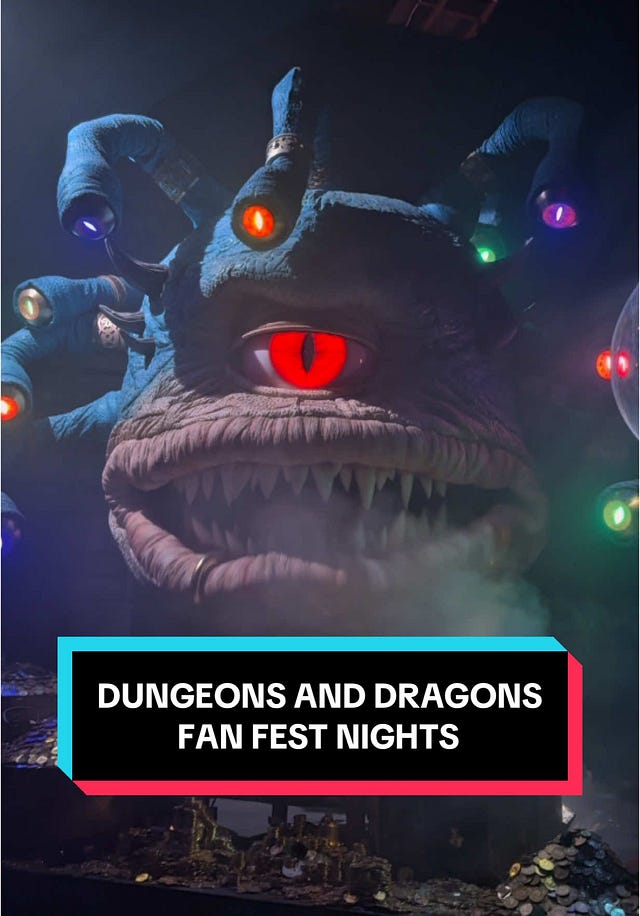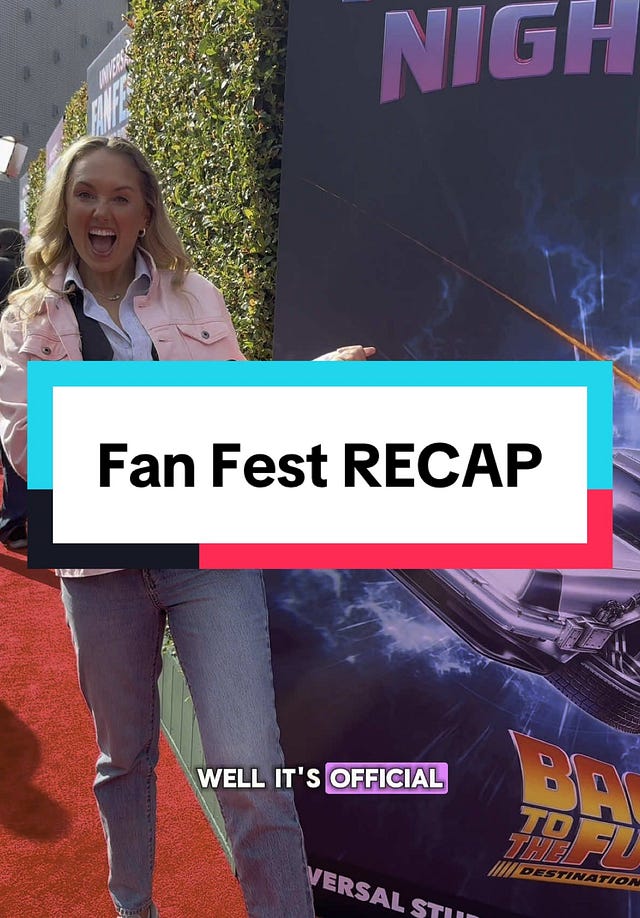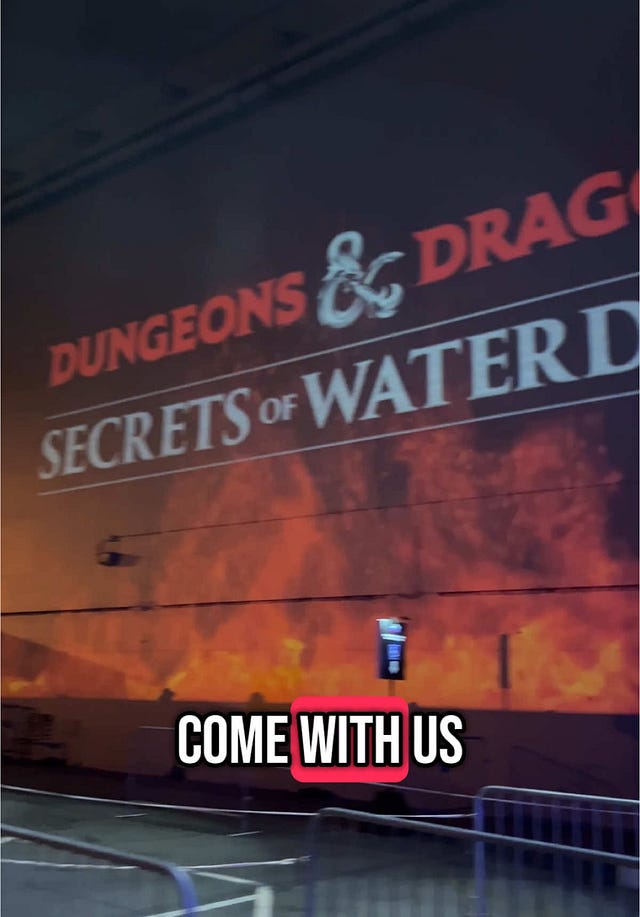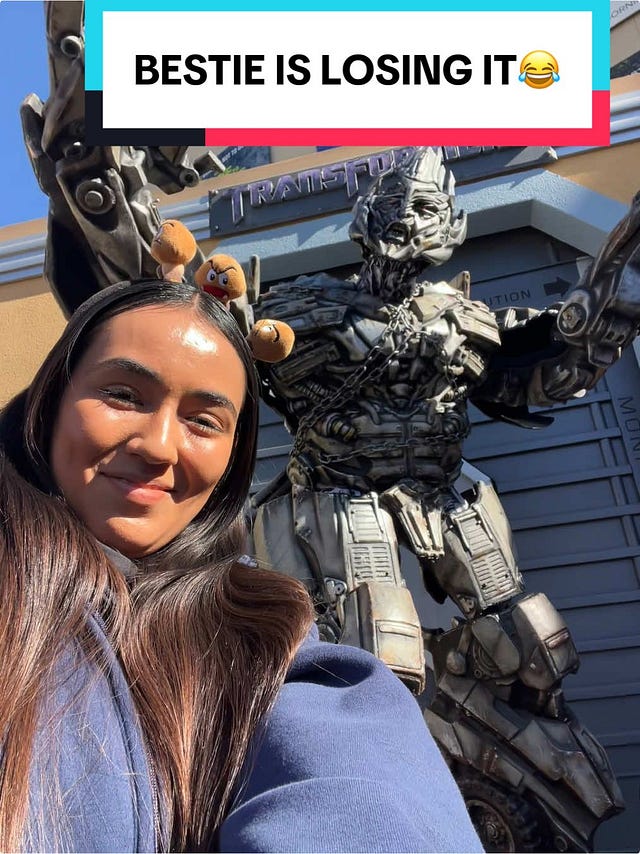Organic Information Systems at DnD Fan Fest Nights
Article pages are a gelatinous cube of information
This is a special edition because this week my brain was torn in two directions resulting in the purchase of plane tickets. For class, I spent a lot of time thinking about information systems. Much of the reading and research you can do on information systems is technical. We could spend hours discussing the journey a reader takes from finding a news article on Bluesky to handing over credit card information, to how that information creates a profile on a user database which then begins to catalog preferences. And while it seems everyone in the media world right now is solidly focused on strategies around signups, and strategy around distribution, and strategy around, well, strategy, I am much more interested in the emotional information systems that encourage you to give your credit card information in the first place. The journey inside your head that takes place to even get you to read, understand and remember a piece of information, and consider it valuable enough to do it again.
With a team of engineers, I once spent an entire year thinking about paywall algorithms, and exactly what action should be presented at what point based on where you clicked, how fast and what you clicked on. But none of that told me anything about how you felt. We can make some educated guesses, but the hard, sad truth is that most of Big Media doesn’t care if you clicked something because you hated it or it made you feel hopeless or upset, or left you feeling helpless. A click is a click and it pays the bills.
But the hopelessness you feel after consuming that media is part of a long problem of inequity in information and knowledge systems. Let’s look at some stats from a Pew Research study from 2023: (Stay with me, I promise Dungeons and Dragons is coming)
“46% of adults ages 30 to 49 said in 2016 that they followed the news all or most of the time. As of last year, 27% said this – a decline of 19 percentage points. Although the decline was smaller among adults 18 to 29, their share was relatively low to begin with: 27% said they followed the news closely in 2016, and this fell to 19% in 2022.”
So the group most likely to want to read the news is avoiding it more. And the group that is new to consuming information on their own and understanding how to synthesize news, is becoming totally uninterested. But there’s more…
“Those who discuss politics a few times a month or less are 10 percentage points more likely to feel news fatigue than those who do so nearly every day (69% vs. 59%). Those who talk about politics a few times a week fall in between at 65%.”
To break that down:
News fans are more likely to go seek out and engage with the news, but on a downward trend.
The people who are turned off by the news, are less likely to engage with the news. That means there is an aversion to finding and consuming information in a group that is unlikely to discuss that information in the first place.
The folks who don’t have information consumption as part of their daily rituals, are missing out on the pieces of information they need to make informed decisions that will better their lives.
If you feel there is no great value, or you are “othered” by the news, you are less likely to seek out the information it provides. In this way, the news business has created an information system where the platforms are designed for the people who they believe deserve the knowledge, while the experience for folks who have no other access is poor altogether. The uneducated class stays uneducated.
If technical information systems focus on one flow:
Efficiency: speed in load time and access points
Structure: Ability to click through a rabbit hole, meta data for prioritization and discovery
Safety: Data safety and systems integration
Organic information systems, the ones native to who we are as humans and who make you feel welcomed and able to try something new, take a turn on this:
Flexibility: How can I consume this information?
Empathy: Is it created with my feedback and needs in mind?
Culture: How does it encourage a station in my long term memory and speak to my rituals?
Back in a place where I feel much more welcome, Universal Fan Fest Nights presents Dungeons and Dragons: Secrets of Waterdeep, which runs Friday and Saturday nights from April 25th through May 18th of this year in Hollywood. This is a separately ticketed event starting at $74 per person from 7pm on, and that does not include daytime park admission. According to WDWNT.com, “guests, along with the leaders of the local Harpers, must team up to steal back the Dragon Staff of Ahghairon and save Waterdeep from its impending doom at the hands of Xanathar.” You should just pause here and go read the entire review if you enjoy sentences like, “when the Tiefling goes to inspect a large treasure chest, she finds that it is, in fact, a Mimic!”
Though we’re just a few days in, my dude Xanathar the Beholder is all over TikTok.
Someone at Universal knows that we’re more likely to remember events that are emotionally charged. Though we are more likely to retain traumatic memories longer for survival reasons, surprise and awe help us to narrow our scope of attention, focus and retain that information. And if you happened to buy a Bag of Holding at Fan Fest Nights, you’re even more likely to recall the emotion and memory of the evening, according to a 2017 study by the USC Marshall School of Business.
“In a final study, the researchers looked at the impact of buying mementos. Specifically, people who purchased merchandise or professional photos of the studied event (a fun run) did not predict they would recall or talk about the race more than others, but two months later they did report talking about the experience and looking at photos more often.”
With the ability to play a beautifully crafted live DnD game with other community members, see characters come to life by the Jim Henson Creature Company, become surprised by the quality of the experience and buy a memento afterwards, this event taps into the ideal flow for an organic information system.
Informal communication and feedback: This was created by a team that understands what elements and topics will excite fans. You can literally buy “rations” aka a charcuterie board, and a Gelatinous Cube in the DnD restaurant, First Roll Tavern.
Coordination and collaboration: Guests engage with each other and characters and form bonds around a shared goal, both inside the experience and outside by commenting on TikToks and blogs. Guests are encouraged to cosplay at all events (including Star Trek, Back to the Future, One Piece and Wicked), understanding that cosplay is a big part of these communities.
Knowledge sharing in a community of practice: The most dedicated practitioners are sharing information with new fans, solidifying continuation of the IP. The fandoms are opened up to new generations with entry-level information sharing, as opposed to the focus on news that highlights people who are more likely to search for news. Info Flow: Mentor ➝ New Fan ➝ Mentor .
Rituals and cultural practices: Identifying the rituals that belong to the game, rather than forcing guests to follow their own flow, cultivates a positive and consistent experience that encourages return visits.
I don’t even know what’s happening here, clearly some kind of relationship, but it’s giving me pure joy.
Fandoms themselves are organic information systems based around ritual. While the act of opening a newspaper at the breakfast table may have once been a ritual (when we designed the WSJ Print Edition app during the pandemic we created a morning alert that would mimic receiving the “thud” of the paper at your door) the user experience of discovering and reading a news article has come so far from that.
Beyond cheap tactics like gamifying the number of articles read, we’ve yet to understand what it really is about consuming, remembering and sharing information that creates value. Our article pages are a gelatinous cube of information, there’s something in there, maybe, but I forgot. Perhaps in the collaboration, passion, rituals and rules of a DnD game we can identify actions that make consuming information valuable for those who need it most.
Where do you see organic information systems at play that we can learn from?
Goodnight, Commenters
Annemarie











the WSJ e-paper alert is so cute :') also loved this line: " the news business has created an information system where the platforms are designed for the people who they believe deserve the knowledge, while the experience for folks who have no other access is poor altogether."
reminds me of how so many newsletters and niche pubs now target specific job functions or industries (since the morning brew boom). feels like there’s a whole ecosystem of highly tailored info for people whose attention is especially valuable to advertisers.. which really echoes your point about who’s seen as deserving of knowledge in the first place.